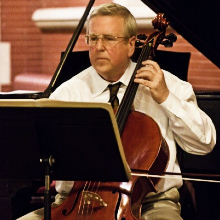Main Content
William Cernota
William Cernota, Assistant Lecturer
Music
William Cernota, Cello and Double Bass, has been a member of the Chicago Lyric Opera Orchestra since 1982. Since 1994, he has been a member and Chair of the Lyric Opera Orchestra Members Committee. From 1982 to 1996, he was a substitute cellist with the Chicago Symphony Orchestra. While a student of Chicago Symphony Principal Cellist Frank Miller, he was Principal Cellist of the Chicago Civic Orchestra, where he performed as soloist in Richard Strauss’s Don Quixote and Ernest Bloch’s Schelomo. He has also been Principal Cellist of the Chicago Chamber Orchestra, Concertante di Chicago, Chicago Opera Theater, Peninsula Music Festival, and is currently Principal Cellist of the Southern Illinois Music Festival.
He has performed annual recitals since 2011 on international broadcasts from WFMT Chicago with pianist Eric Weimer. He was a soloist on two European tours of the Chicago Chamber Orchestra and is a member of the music faculties at Loyola University Chicago and Southern Illinois University Carbondale.
Following graduation in Ideas & Methods and Biology from the University of Chicago, he served three years in the Peace Corps, Sierra Leone, as a biology teacher and band director. He appears in contemporary music concerts and has also performed on baroque cello. He performed Witold Lutosławski’s works for solo cello at Orchestra Hall, Symphony Center in Chicago, with the composer in attendance.
With pianist Joy Doran, he issued a CD: On or About December 1910. He also works as a research scientist at Fermalogic Incorporated in Chicago and completed a Master's in Engineering Degree at the University of Illinois, Chicago. He resides in Chicago with his wife Maria, daughter Naomi, and cellist son-in-law Aleksei.
“Musical training is a more potent instrument than any other, because rhythm and harmony find their way into the inward places of the soul, on which they mightily fasten, imparting grace…Music is a moral law. It gives soul to the universe, wings to the mind, flight to the imagination, a charm to sadness, gaiety and life to everything. It is the essence of order and leads to all that is good, true, and beautiful, of which it is the invisible, but nevertheless, dazzling, passionate, and eternal form.
—Plato




 Office: OBF, Room 114
Office: OBF, Room 114